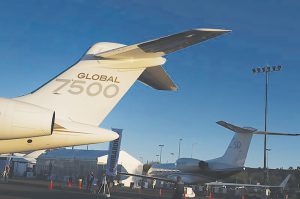Chris Bryant
Fed up with having his private jet tracked by climate activists typing on Twitter, Bernard Arnault has sold the capacious Bombardier 7500 aircraft belonging to his luxury goods company LVMH Moet Hennessy Louis Vuitton SE. But the world’s third-richest man isn’t about to join the masses flying commercial (quelle horreur!). Instead, Arnault plans to rent private aircraft: “The result now is that no one can see where I go,†he told LVMH-owned Radio Classique this week.
Arnault’s riposte was a public-relations gift to private jet operators including NetJets, Flexjets and Vista Global, who have long touted the privacy advantages of alternatives such as fractional ownership and pre-paid blocks of flying time.
Happily, an until-now rather opaque industry is poised to subject itself to more transparency, not less. Two of the biggest private jet operators, Flexjet Inc. and flyExclusive, confirmed this month they plan to go public via special purpose acquisition companies. With Wheels Up Experience Inc. completing a SPAC listing last year, three of the industry’s five biggest companies will soon be publicly traded. 1 Tapping the public markets for cash will help private aviation grow faster — but it will also bring welcome scrutiny of its climate record.
So far, the threat of a global economic downturn has yet to puncture the industry’s optimism. Health concerns prompted many rich folks to board a private jet for the first time during the pandemic. The delays, cutbacks and crowded airport lounges that have beset commercial aviation lately have made them reluctant to give up their new habit.
While industry claims about a “democratization of private aviation†might be taking things a bit far, wealthy travelers certainly have more options these days, especially if they don’t wish to be tracked.
“Anonymity and discretion have always been key benefits of our program,†Patrick Gallagher, NetJets president of sales, marketing & service, told me via email. “Passengers cannot be tracked back to any tail number or flight.†Whereas “if you have your own jet…you can be tracked,†Vista’s billionaire founder Thomas Flohr told the Sunday Times last week. “With us, it’s completely anonymous.â€
Chartering or fractional ownership can also be more cost-efficient than whole aircraft ownership. Even if you fly frequently and are hellbent on customizing your jet with a bespoke leopard-print cabin, a jet card — akin to a debit card for private flights — can make sense as a back-up. For the even more cost-conscious, discounted one-way tickets are available on so-called empty-leg flights when aircraft are being repositioned.
To be sure, the private-jet operators have had their share of issues. NetJets and others were forced to suspend jet-card sales last year to preserve service quality. Pilot shortages remain a problem; some private jet companies relied on US government handouts to retain pilots during the pandemic, which made it seem like taxpayers were subsidizing the travel habits of the super-rich.
Yet Flexjet forecasts $2.3 billion in revenue this year, more than 70% better than in 2019.
—Bloomberg
 The Gulf Time Newspaper One of the finest business newspapers in the UAE brought to you by our professional writers and editors.
The Gulf Time Newspaper One of the finest business newspapers in the UAE brought to you by our professional writers and editors.
